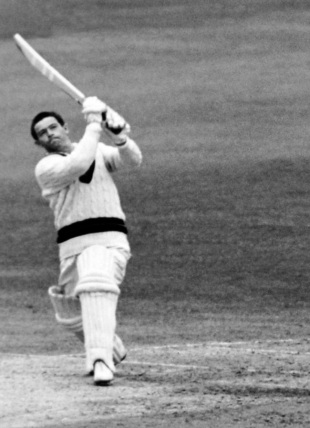Harry Pilling

|
|||
|
Related Links
Players/Officials:
Harry Pilling
Teams:
England
| Lancashire
|
|||
HARRY PILLING, who died on September 22, aged 69, was 5ft 3in and thought at the time to be the smallest player in county cricket. But his height proved no impediment during the late 1960s and early '70s, when Lancashire were the best one-day side in the country. Pilling's frequent partnerships with Clive Lloyd - more than a foot taller - provided an engaging study in contrasts. Once, the story goes, the two were standing together between overs. "Pilling," said the TV commentator, "is the one in the cap."
Pilling began his cricketing life with Staley in the Saddleworth League and, after leaving school, joined Lancashire in 1959 aged 16. Not that the game brought great security: for much of his career he had to find work when the season finished. He made coffins, was an apprentice butcher, put the handles on umbrellas, and worked in a cotton mill. He even shovelled coal. "I was No. 1 shoveller," he boasted. "Three shovelfuls to a bag - not bad for somebody of my size." When he joined the staff, he was a leg-spinner standing only 4ft 7in and weighing little more than five stone. Jam and bread, he said, had been among his most regular meals. And the Old Trafford he walked into could be unpleasant: the atmosphere was shaped by autocrats such as Cyril Washbrook ("an arrogant professional who wished he was an amateur," reckoned Harry), and it would be nearly another decade until Lancashire's modernisation was led by Jack Bond. "They called them the good old days," said Pilling, "but they weren't always."
For three years he played for the Second Eleven and, when the call came for a first-class match, it was unexpected. "Stand up and give Pierre a round of applause," ordered coach Stan Worthington. Pilling - who had a haircut his team-mates thought made him look like a Frenchman - said: "It were embarrassing. I had to climb off bus past 'em all clapping."
Pilling played under three captains before Lancashire settled for Bond in 1968. He created a side, partly by accident, which was ideal for the newish game of one-day cricket. Lloyd and Farokh Engineer arrived, Bond was interested in fielding as an attacking strategy, and young locals such as David Hughes and Jack Simmons were, in Pilling's words, the "kamikaze pilots" who thrashed lower-order runs. The result was Sunday League titles in 1969 and 1970, and a hat-trick of Gillette Cups from 1970. Pilling - now a top-order batsman - was Man of the Match in the first final, despite fearing the format would kill his career. "I was a nicker and a nudger," he said. "I wasn't a big strokeplayer. I thought the one-day stuff was just crash-bang-wallop."
As it turned out, his skills of deflection and placement, and his square cut, were perfect attributes: he was the first player to reach 1,000 runs in the Sunday League. "We all adored him in the dressing-room," said the fast bowler Peter Lever. "He was the essence of Lancastrian cricket. It was almost as if he would die for his team-mates."
Pilling scored more than 15,000 first-class runs, but never played for England. He came close twice, in 1970 and 1976, when a pair of hundreds in July looked likely to win him a place against West Indies. He remembered driving with the radio on, listening to the squad being called. "They went past 'P' and I thought: 'That's that, then.' I'd have loved to have played. Just to get one cap and be given the chance. But I wasn't everyone's favourite person." The dressing-room whisper, perhaps apocryphal, was that Washbrook - who had been an England selector - had warned: "Forget it. He's a drunkard."
Pilling gladly admitted to liking a few pints, and grinned that he would add a couple of miles to his petrol claims on away trips to pay for them. In truth, he liked too many, and it was after his career ended in 1982 that his drinking became particularly damaging. He described his local pub as "all effin' and blindin' and gum boots". His best mate at Lancashire had been John Sullivan, a former amateur boxing champion, and the pair caused mischief for years. Their dressing-room nicknames of H. Dirt and J. Filth summed up their relationship and pursuits. "We were in a club one night," said Harry, "and some bloke tried to touch John up in t'toilet, so Sully smacked him once and he were flat out on t'stones."
There were many more such tales, some of which Pilling would retell at his bungalow outside Bolton. Speaking with quiet generosity of those he had played with and against, he sipped from a pint mug of tea and drew on a roll-up. His little dog never left his side, knowing there were boiled sweets in the pocket of his tracksuit trousers. "No matter where Harry goes now," said Jack Simmons at his funeral, "he will be loved, because he'll be as popular as he ever was."

